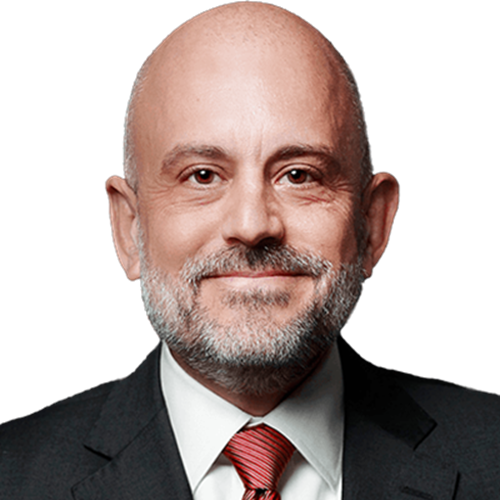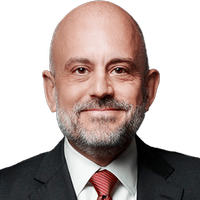Investments or You: Which Does Your Adviser Focus On?
If you said investments, you may not be getting the best advice. Unfortunately, it’s a common problem. Your adviser needs to dig deeper, and you need to know the right questions to ask.

Profit and prosper with the best of Kiplinger's advice on investing, taxes, retirement, personal finance and much more. Delivered daily. Enter your email in the box and click Sign Me Up.
You are now subscribed
Your newsletter sign-up was successful
Want to add more newsletters?

Delivered daily
Kiplinger Today
Profit and prosper with the best of Kiplinger's advice on investing, taxes, retirement, personal finance and much more delivered daily. Smart money moves start here.

Sent five days a week
Kiplinger A Step Ahead
Get practical help to make better financial decisions in your everyday life, from spending to savings on top deals.

Delivered daily
Kiplinger Closing Bell
Get today's biggest financial and investing headlines delivered to your inbox every day the U.S. stock market is open.

Sent twice a week
Kiplinger Adviser Intel
Financial pros across the country share best practices and fresh tactics to preserve and grow your wealth.

Delivered weekly
Kiplinger Tax Tips
Trim your federal and state tax bills with practical tax-planning and tax-cutting strategies.

Sent twice a week
Kiplinger Retirement Tips
Your twice-a-week guide to planning and enjoying a financially secure and richly rewarding retirement

Sent bimonthly.
Kiplinger Adviser Angle
Insights for advisers, wealth managers and other financial professionals.

Sent twice a week
Kiplinger Investing Weekly
Your twice-a-week roundup of promising stocks, funds, companies and industries you should consider, ones you should avoid, and why.

Sent weekly for six weeks
Kiplinger Invest for Retirement
Your step-by-step six-part series on how to invest for retirement, from devising a successful strategy to exactly which investments to choose.
Every investor wants to see their money grow – it’s a given. So, if growth is already the assumption when it comes to saving and investing, what describes the goal you have for your money?
As you build wealth, it is important to know why you’re building the wealth, not just learning about what investment to add to your portfolio. This may sound like common sense, but I wouldn’t be spending my time writing this article if it weren’t a common problem.
Many Advisers Commit Investment ‘Malpractice’
Discussing investment options without first having a strategic plan in place is like asking for a prescription without a diagnosis. I see a lot of “malpractice” (yes, pun intended) when it comes to investing, just as it would be if your doctor offered a prescription before establishing a diagnosis.
From just $107.88 $24.99 for Kiplinger Personal Finance
Become a smarter, better informed investor. Subscribe from just $107.88 $24.99, plus get up to 4 Special Issues

Sign up for Kiplinger’s Free Newsletters
Profit and prosper with the best of expert advice on investing, taxes, retirement, personal finance and more - straight to your e-mail.
Profit and prosper with the best of expert advice - straight to your e-mail.
I was meeting with a doctor the other day and was working through getting to know her a bit, and in the middle of the conversation she asks the question many people ask, “What investments are you recommending?” As a financial planner, I struggle with these types of questions, because I believe that they are the wrong type of questions to ask.
My response was, if you met with a new patient and they were to ask you, “What prescriptions are you recommending?” what would you say? She responded that it wouldn’t be a question she would be able to answer, because what she prescribes would depend on what the patient needs.
Of course! Because that makes sense. Imagine visiting with your doctor and the 10 minutes spent with them is centered around a new drug that has promising results for some random ailment. They walk through explaining the clinical trials, then break down the cost to purchase the drugs, while offering a brochure as they ask you what you think about the drug.
That would be odd, wouldn’t it? Yet, this is exactly what happens in the investment world. The conversations people think they should be having with financial advisers revolve around investment options, past performance, fees, alpha, beta, standard deviation, market correlation, risk tolerance and on and on…
These conversations have a time and a place, but this information has nothing to do with solving a problem (i.e., retirement income planning). The idea that you can just buy an investment because it looks good on paper is an upside-down way of thinking. It is equivalent to buying the prescription without a diagnosis.
A Man Who Was Asking All the Wrong Questions
I talked with a gentleman recently who reached out after listening to one of my podcasts. When we connected to talk, it was clear that he was frustrated after having met with several advisers and hearing about portfolio management styles, approaches to diversification, benchmarks and performance. After all of these conversations, he was not feeling satisfied with what he heard, which led him to reach out to me for help.
It was apparent to me that he had sat through many sales presentations in an effort to find that perfect investment. But what I discovered in the first five minutes speaking with him was that he wasn’t actually looking for another investment but rather he wanted confidence about his goals for the future.
Inherently, people will try to circumvent a situation when there is a vacuum of knowledge or understanding about something by defaulting to what they already known and understand. For him, it was investments. He understood investments, and without knowing it, he was asking the wrong questions.
People who have accumulated wealth know and understand how to grow money, but when it comes time to begin using the money or protecting it, it can lead to confusion and uneasiness, which has them resorting back to what they know. It is circular reasoning that most often leads to an unfulfilled objective.
So, getting back to my conversation with the gentleman…
I asked him about what he was telling the advisers he wanted to do, and he replied that he told them he wants to grow his money. I said, yes – everyone wants their money to grow, but did you share anything else with them about what you wanted for your life?
I asked him that follow-up question because here again, when he was speaking with these other financial advisers, they were obviously sharing their investment ideas with him – but nothing he was hearing quenched his proverbial thirst. So, there was obviously something missing in the conversations, and if I was going to help him, I had to understand what was being overlooked.
He replied by saying that he wasn’t asked anything other than risk tolerance type of questions.
Getting to the Heart of the Matter Leads to a Surprise
In my endeavor to not be another failed attempt with a financial adviser, I dug a little deeper. I asked him if he saw a need for the money in the future. Did he need it for income or have a plan that required spending any of it? His reply was no, that he had no need for the money while he was living.
That last phrase raised my curiosity, so I asked, what do you mean “while you are living?” He proceeded to say, I want to make sure my wife is taken care of if I die.
BINGO! It was suddenly clear, and I said to him, I see the issue you’ve been having. I proceeded to ask him what the No. 1 priority in his life was right now. He replied, to make sure his wife is good if he dies. I replied by saying that taking care of his wife is exactly what the problem has been all along. He’s been having the wrong conversations with these other advisers.
He was not looking for another investment to purchase; he wanted his wife taken care of, and that involved having a strategic plan in place. We spent the rest of the call discussing how to take care of his wife.
Financial advisers are so focused on gathering assets to manage that they often miss the forest for the trees. They assume that everyone wants their investments to grow while trying to prove they are better than the next adviser without considering what the client really needs the money for, and that is a huge problem.
Your Future Is About More than Just Money
Financial planning is not about investments; it is about mapping out how to use money now and in the future. The investments and other products are simply used as a catalyst to fulfill the goals. Too many advisers confuse this, and in turn it confuses the public into thinking that they should always be shopping for the next best investment.
It is easy to suggest that the gentleman in my example should have known all along what the issue was, but it is not that simple. People, in general, don’t understand the disconnect between their needs and investments. I know this from the thousands of conversations I have with people with large investment portfolios, who are perplexed on how to use the money they have accumulated to meet their retirement needs. I explain how to do this in my podcast episode titled “Six Steps to Ensure You’re Ready for Retirement.”
But finding the right adviser to assist you in developing a plan can be tricky for the reasons I have already explained. You can learn more about what to look for in a financial adviser by reading my column, “The Financial Fiduciary Standard Explained.”
Here are a few things you can do to increase your probability of success and assist with getting a plan in place to meet your objectives:
- Ask yourself what the reason is for growing your money. Remember, there are specific things you need the money to do for you, focus on that. How will you use the money?
- Then pay attention during the next conversation with an adviser, noting how much of the conversation is about your life goals, concerns about the future, tax situation and other non-investment related topics versus how much of it centers around investment products. I see this as the 80/20 rule, 80% of the time needs to be spent on what you’re trying to accomplish, and the strategy for how to make that happen and the other 20% is about what products to use. Otherwise, you are just sitting in a sales presentation, not a financial planning discussion.
- Resist the temptation of asking about investments and force the conversation to be centered around your goals. Explain your goals for the money instead of projecting your expectation of return and risk tolerance, and if the adviser seems focused on their product or investment strategy, find another adviser.
That is how you get the right diagnosis and the right prescription.
Need help getting your thoughts on paper? You can get a copy of my, Financial Vision Guide for free by visiting the resource page of my website.
Securities offered through Kalos Capital Inc., Member FINRA/SIPC/MSRB and investment advisory services offered through Kalos Management Inc., an SEC registered Investment Advisor, both located at 11525 Park Wood Circle, Alpharetta, GA 30005. Kalos Capital Inc. and Kalos Management Inc. do not provide tax or legal advice. Skrobonja Financial Group LLC and Skrobonja Insurance Services LLC are not an affiliate or subsidiary of Kalos Capital Inc. or Kalos Management Inc.
Securities offered only by duly registered individuals through Madison Avenue Securities, LLC. (MAS), Member FINRA & SIPC. Advisory services offered only by duly registered individuals through AE Wealth Management (“AEWM”), a registered investment adviser. Skrobonja Financial Group, LLC, Skrobonja Insurance Services, LLC, AEWM and MAS are not affiliated entities. The article and opinions in this publication are for general information only and are not intended to provide specific advice or recommendations for any individual. We suggest that you consult your accountant, tax or legal adviser with regard to your individual situation.
Profit and prosper with the best of Kiplinger's advice on investing, taxes, retirement, personal finance and much more. Delivered daily. Enter your email in the box and click Sign Me Up.

Brian Skrobonja is a Chartered Financial Consultant (ChFC®) and Certified Private Wealth Advisor (CPWA®), as well as an author, blogger, podcaster and speaker. He is the founder and president of a St. Louis, Mo.-based wealth management firm. His goal is to help his audience discover the root of their beliefs about money and challenge them to think differently to reach their goals. Brian is the author of three books, and his Common Sense podcast was named one of the Top 10 podcasts by Forbes. In 2017, 2019, 2020, 2021 and 2022, Brian was awarded Best Wealth Manager. In 2021, he received Best in Business and the Future 50 in 2018 from St. Louis Small Business.
-
 Look Out for These Gold Bar Scams as Prices Surge
Look Out for These Gold Bar Scams as Prices SurgeFraudsters impersonating government agents are convincing victims to convert savings into gold — and handing it over in courier scams costing Americans millions.
-
 How to Turn Your 401(k) Into A Real Estate Empire
How to Turn Your 401(k) Into A Real Estate EmpireTapping your 401(k) to purchase investment properties is risky, but it could deliver valuable rental income in your golden years.
-
 My First $1 Million: Retired Nuclear Plant Supervisor, 68
My First $1 Million: Retired Nuclear Plant Supervisor, 68Ever wonder how someone who's made a million dollars or more did it? Kiplinger's My First $1 Million series uncovers the answers.
-
 Don't Bury Your Kids in Taxes: How to Position Your Investments to Help Create More Wealth for Them
Don't Bury Your Kids in Taxes: How to Position Your Investments to Help Create More Wealth for ThemTo minimize your heirs' tax burden, focus on aligning your investment account types and assets with your estate plan, and pay attention to the impact of RMDs.
-
 Are You 'Too Old' to Benefit From an Annuity?
Are You 'Too Old' to Benefit From an Annuity?Probably not, even if you're in your 70s or 80s, but it depends on your circumstances and the kind of annuity you're considering.
-
 In Your 50s and Seeing Retirement in the Distance? What You Do Now Can Make a Significant Impact
In Your 50s and Seeing Retirement in the Distance? What You Do Now Can Make a Significant ImpactThis is the perfect time to assess whether your retirement planning is on track and determine what steps you need to take if it's not.
-
 Your Retirement Isn't Set in Stone, But It Can Be a Work of Art
Your Retirement Isn't Set in Stone, But It Can Be a Work of ArtSetting and forgetting your retirement plan will make it hard to cope with life's challenges. Instead, consider redrawing and refining your plan as you go.
-
 The Bear Market Protocol: 3 Strategies to Consider in a Down Market
The Bear Market Protocol: 3 Strategies to Consider in a Down MarketThe Bear Market Protocol: 3 Strategies for a Down Market From buying the dip to strategic Roth conversions, there are several ways to use a bear market to your advantage — once you get over the fear factor.
-
 For the 2% Club, the Guardrails Approach and the 4% Rule Do Not Work: Here's What Works Instead
For the 2% Club, the Guardrails Approach and the 4% Rule Do Not Work: Here's What Works InsteadFor retirees with a pension, traditional withdrawal rules could be too restrictive. You need a tailored income plan that is much more flexible and realistic.
-
 Retiring Next Year? Now Is the Time to Start Designing What Your Retirement Will Look Like
Retiring Next Year? Now Is the Time to Start Designing What Your Retirement Will Look LikeThis is when you should be shifting your focus from growing your portfolio to designing an income and tax strategy that aligns your resources with your purpose.
-
 I'm a Financial Planner: This Layered Approach for Your Retirement Money Can Help Lower Your Stress
I'm a Financial Planner: This Layered Approach for Your Retirement Money Can Help Lower Your StressTo be confident about retirement, consider building a safety net by dividing assets into distinct layers and establishing a regular review process. Here's how.
